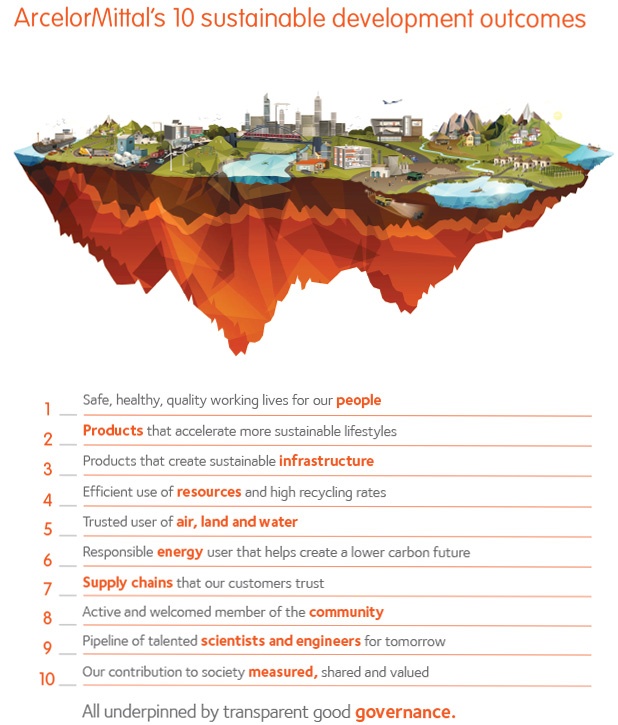The following is excerpted from Issue 23 of The Corporate Citizen. To learn how to differentiate your company by developing strategic commitments to managing natural resources, consider joining us in Dallas, TX May 2-3, 2018 for our Environmental Sustainability 101 course.
 ArcelorMittal’s business operations are undeniably widereaching: The company has 199,000 employees across 60 countries who together contribute to the annual production capacity of approximately 113 million metric tons of crude steel, which is used to serve markets such as automotive, construction, and household appliances. While the scope and impact of ArcelorMittal’s work is impressive, the sustainability efforts undertaken by its employees are arguably even more so.
ArcelorMittal’s business operations are undeniably widereaching: The company has 199,000 employees across 60 countries who together contribute to the annual production capacity of approximately 113 million metric tons of crude steel, which is used to serve markets such as automotive, construction, and household appliances. While the scope and impact of ArcelorMittal’s work is impressive, the sustainability efforts undertaken by its employees are arguably even more so.
In 2014, the ArcelorMittal team completed a thorough and strategic materiality process, which laid the groundwork for the creation of a sustainable development framework. “We knew we had really good CSR initiatives that were having positive impacts, and that we had great relationships with our partners,” said Marcy Twete, executive director, ArcelorMittal USA Foundation; division manager, corporate responsibility, ArcelorMittal Americas. “But what we were missing was a big-picture strategy that would match our work to what the company was doing commercially.”
While the materiality process was both collaborative and iterative, the team kept focused by setting out to answer the question: What would it mean if ArcelorMittal was the most sustainable steel company in the world? The answer to that question took the form of 10 sustainable development objectives that now shape all aspects of ArcelorMittal’s operations, from how the company makes steel and uses resources, to how it develops new products and supports its employees and communities.
“Our 10 sustainable development outcomes were designed to ensure we manage to stay ahead of expectations,” said Lakshmi N. Mittal, ArcelorMittal's chairman and chief executive officer. “The outcomes also demonstrate our understanding that long-term success lies not only in creating shareholder value, but also in actively contributing to society's needs.”
To see one of ArcelorMittal's sustainability initiatives in action, one does not have to look any further than to the Great Lakes, and to the partnership ArcelorMittal forged with the National Fish and Wildlife Foundation and a handful of public agencies. Established in 2007, Sustain Our Great Lakes is an initiative whose mission is to sustain, restore, and protect the fish, wildlife, and the habitat of the Great Lakes basins by leveraging funding, building conservation capacity, and focusing partners and resources toward key ecological issues.
“The steel industry is very water-intensive. While we intake about 1.5 billion gallons of water a day, we return about 80 percent of that by recycling and returning it to its source, oftentimes cleaner than when we took it out,” said William C. Steers, president, ArcelorMittal USA Foundation; general manager, communications & corporate responsibility, ArcelorMittal Americas. “As such, we knew that we had to find a way to get engaged in the sustainability conversation, and to leverage the expertise partners could bring to the table.”
Building trust was a key component to the success of the partnership, as was acknowledging that there was a lot that all parties could learn from one another. As Steers recalled, “it was important to make the initiative broad enough that it resonated across a lot of people, but specific enough to conjure passion and get people engaged around opportunities where they can make an impact.”
As is consistent with its 10 sustainable development outcomes, Sustain Our Great Lakes positions ArcelorMittal to join forces with the communities in which its employees live, and its business and clients operate.
It has also positioned the company to make a huge and measureable impact: Since 2010 the company has reduced its global water consumption by 6 percent. If the relevant research is predicative, the benefits of having created a formal corporate citizenship policy— one with targets, measures, and consequences—will, over the long term, continue to propel ArcelorMittal to outperform companies that do not have similar policies.[i] This is promising news for the firm that is positioned to become the most sustainable steel company in the world.
[i] Jones, D., Willness, C., & Madey S. (2014). Why are job seekers attracted by corporate social performance? Experimental and field tests of three signal-based mechanisms. Academy of Management Journal, 57 (2), 383-404.